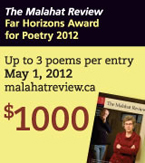2012 Far Horizons Award for Poetry

Deadline: May 1, 2012
Prize: $1000 CAD
Entry fee: $25 CAD for entries from Canada
$30 USD for entries from the US
$35 USD for entries from elsewhere
Poets who are not yet published in book form (book = 48 pages or more) are encouraged to enter up to three poems (60 lines max. each).
Read full contest guidelines on our website.
To write a good poem: Chelsea Rushton catches up with 2010 Far Horizons Award for Poetry winner Darren Bifford
 Chelsea Rushton: Since your poem "Wolf Hunter" won The Malahat Review's 2010 Far Horizons Award for Poetry, you and Cactus Press have published a chapbook with the same name, and you've developed a manuscript, Wedding in Fire Country, to be published in the spring of 2012 by Nightwood Editions. The chapbook and the manuscript both contain this poem, and also a response to it, entitled "Wolf Hunted." Which poem came first? And what is the significance for you in giving the wolf a voice also? Chelsea Rushton: Since your poem "Wolf Hunter" won The Malahat Review's 2010 Far Horizons Award for Poetry, you and Cactus Press have published a chapbook with the same name, and you've developed a manuscript, Wedding in Fire Country, to be published in the spring of 2012 by Nightwood Editions. The chapbook and the manuscript both contain this poem, and also a response to it, entitled "Wolf Hunted." Which poem came first? And what is the significance for you in giving the wolf a voice also?
 Darren Bifford Darren Bifford: “Wolf Hunter” was written first. Almost as soon as I finished the first draft of that poem, I began to write another poem from the stand-point of the wolf. Not much stood between them—maybe another cup of coffee at the Gladstone. At the time I didn’t intend the counter-point of the imagined voice of the wolf to have any moral significance—though, I guess, that sort of reading is difficult for me to avoid now. My ambition was more technical: I wanted to offer myself only the experiment of writing the same kind of lyrical monologue but from another point of view. It strikes me that to the extent these poems are at all successful, it’s because I didn’t begin writing with any sort of philosophical or ethical intention of what I wanted to write about. I began with a question about poetic composition and proceeded for better or worse from there. The content followed of itself.
Read the rest of this interview on our website.
Think of them as a lottery: 2012 Far Horizons Award judge Mary Dalton on poetry and contests.

Portia Carryer: You were the editor of TickleAce for six years and currently work as both a professor of literature and creative writing. Have those roles shaped your writing or thinking? How so?

Mary Dalton: In editing a journal and in teaching literature and creative writing, one engages the analytical aspects of the mind more, I would say. One is responding to texts, thinking of them within various contexts, rather than being involved in the intuitive process of creating one’s own poetic texts. That said, experience as an editor and teacher helps one at the secondary stage of stepping back from one’s own creations and considering how they might be strengthened in the revising process. I do think of the stages of initial creation and of revision as quite distinct activities.
Also, editing and teaching demand that one reads widely, sometimes in areas one might not have explored otherwise. This breadth and depth of reading enriches one’s own writing, sometimes in oblique and unexpected ways.
Read the rest of this interview on our website.
|
|
|
|
|
|